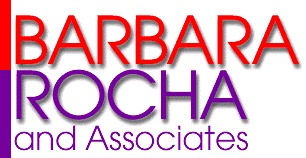Marketing Your Business Through Speaking
by Barbara Rocha
If giving speeches isn’t a part of your marketing mix, why not? Is it because you don’t know how to go about getting speaking engagements, because you don’t know what to say to the audience, or because the thought of speaking brings on a case of the vapors?
If any of those is holding you back, getting the answers will give you a new marketing tool that’s inexpensive and effective.
As a business owner, you’ve already surprised yourself with a number of heretofore hidden talents. If speaking hasn’t been one of your previous strengths, now’s the time to add it to your repertoire.
First: Find your audience.
Your buyers are congregating somewhere; you just need to find them. Your intuition will immediately identify an organization or association or two you’d like to reach.
You can look in your local Yellow Pages under Associations; check the reference section of your library or surf the Net for names of such groups; talk to meeting planners who schedule speakers.
You’re looking for people who are interested in your subject who are likely to have an interest in doing business with you–if only they knew how wonderful you are.
You’ll want to start with a few small audiences to refine your subject matter and your comfort level.
Solve a problem for your audience -- that makes you an expert. If you’re making the arrangements yourself, introduce yourself and your business to the meeting planner or marketing director of your target group in a letter outlining your topic, and include your credentials. This letter should be strongly aimed at WIIFT (What’s In It For Them?).
Let them know you will call to be sure they got the letter, and in that call, ask questions about the group–about previous speakers they’ve had, what most interests the group in terms of topics, what the most successful topics have been.
Second: Decide what to say.
You may be going to all this trouble for a payoff–more business. But when you’re deciding what to say: focus on specific information you can give them that they can use, not on your qualifications.
If you’re a florist, give them some information on how to decide which flowers will hold up best for an occasion that matters to them–an upcoming wedding, a party, Mother’s Day corsage or plant. Or other topics such as how to get the most for their money when they call a florist, or how to get cut flowers to last longer, or how to make their own bridal bouquet.
Don’t make it a commercial, and don’t give away the store. You don’t have to be afraid they’ll all run out and do it themselves. Those who do weren’t going to use your services anyway, and the rest of them will be impressed by your knowledge and your willingness to share. Some of that last group will use your services because they really aren’t interested in doing it themselves.
If you sell cleaning products or are a cleaner, tell them how to remove stains from their clothing–don’t tell them how long you’ve been in business and what a great job you do. Let that be a subtle message in your speech. And it’s appropriate to have that in the brochure you leave with them as well as in the introduction you write for whoever is introducing you.
If you are a meeting planner, tell them how to avoid headaches when dealing with a hotel, or what to watch for when they’re designing the invitation.
Don’t toot your own horn--“Here’s what we can do for you. Here’s how great we are.” That's just an ad, and ads don't generate credibility. Credibility comes from demonstrating your competence in your field by giving information they won't otherwise come by in such a focused, accessible format.
Third: Get comfortable speaking.
You don't have to be nervous. Speaking is not about you--it's about helping your audience. You have a choice: you can either focus on what might happen to you, on what everyone may think about you, or you can focus on helping them by giving them some tips that will make life easier for them. Helping takes away nervousness, makes you look happy, and gives you the energy to be an effective speaker.
